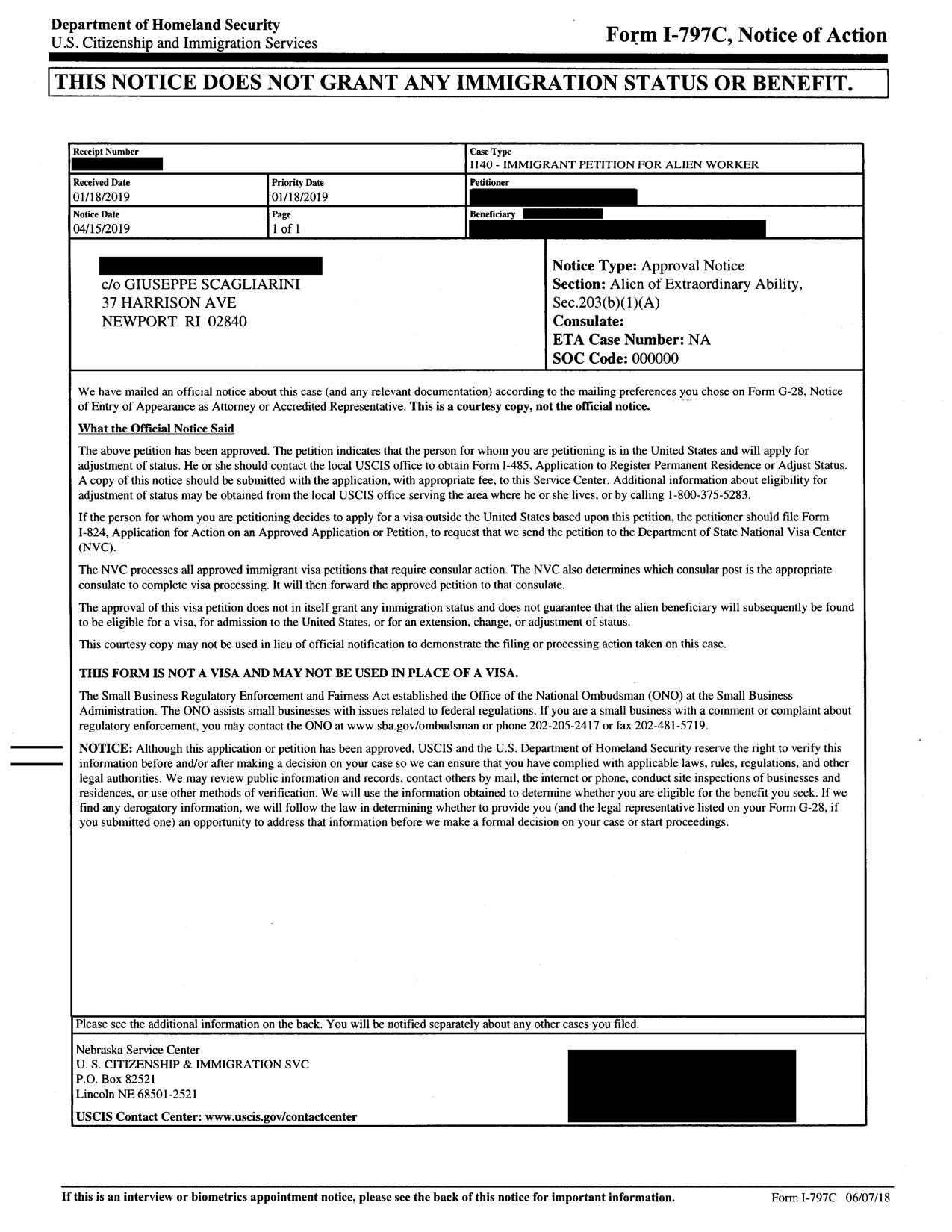Visto E-2
Avvocato di Immigrazione USA – Avvocato per Transazioni Internazionali – Avvocato per Visto E-2
Visto E-2 per Investimento negli Stati Uniti
L’avvocato Giuseppe Scagliarini pratica Diritto di Immigrazione negli USA e ha decenni di esperienza nell’assistere investitori e aziende italiane nella richiesta di Visto E-2 per gli Stati Uniti, sia per l’investitore principale che per Dirigenti, Mangers o Personale Essenziale all’esercizio dell’impresa.
Il Visto E-2 per gli USA puo’ apparire di facile ottenimento, ma la nostra esperienza quotidiana e’ che anche investitori esperti possono sottovalutare le complessita’ di questa categoria di visto per gli Stati Uniti e finire per avere gravi difficolta’ di implementazione del proprio business plan a causa delle intervenute complicazioni nell’ottenimento del visto presso il consolato locale.
Per la peculiarità’ della normativa e per l’importanza dell’esito, consigliamo a tutti di consultare un Avvocato esperto di diritto Immigrazione prima di richiedere un Visto E-2 per Investimento negli Stati Uniti d’America e possibilmente prima ancora di costituire qualsiasi societa’ negli USA.
Per chi non sia intenzionato a spendere per ottenere l’assistenza professionale di un Avvocato per ottenere il Visto E-2 per Investimento o il Visto E-1 per Commercio Tnternazionale, non possiamo offrire assistenza gratuita ma il Sito dell’Ambasciata degli Stati Uniti in Italia, alla Sezione Visti, contiene utili Informazioni su Come Ottenere un Visto di Categoria E (sia per il Visto E-1 per Investimento che il Visto E-2 per Commercio Internazionale).
Ulteriori informazioni sono disponibili presso il sito USCIS.gov alla pagina E-2 Treaty Investors
Quanto segue sono alcune informazioni di carattere generale sul Visto E-2 per gli USA e non costituiscono alcun tipo di legal advice attivabile in nessun caso specifico senza aver consultato un avvocato di immigrazione esperto di visti per gli Stati Uniti.
Il visto E-2 per gli Stati Uniti richiede un trattato internazionale attuativo, ratificato da entrambi i Paesi (una lista dei paesi firmatari di trattati che autorizzano l’emissione di visto E-2 o E-1 e’ disponibile presso il sito del U.S Department of State alla pagina “E1 and E2 Treaty Countries“.
Inoltre, il Visto E-2 richiede che l’investimento sia “Substantial” (cioè’ ingente) e “Irrevocably Committed” (irrevocabilmente destinato all’impresa negli Stati Uniti) prima o comunque al momento della richiesta di visto stesso. Questo crea un notevole livello di complicazione in quanto viene richiesto all’investitore un sostanziale impegno di capitale PRIMA di sapere se e chi sara’ in grado di essere presente nel territorio degli Stati Uniti per dirigere e sviluppare l’impresa.
Per dare diritto a un Visto E-2 l’impresa deve essere “Real and Operating” e cioè’ una impresa operativa e non soltanto un investimento di tipo speculativo. Questo puo’ causare talvolta difficolta’ nel richiedere il visto E-2 per aziende unipersonali o senza alcun dipendente come nel campo di Holding Immobiliari, o di societa’ create unicamente per raccogliere capitale negli Stati Uniti d’America per progetti futuri (Venture Capital, Angel Investing etc). Inoltre, tutte i permessi e licenze per l’esercizio della attività’ devono essere stati ottenuti o in essere in procinto di essere ottenuti e l’azienda deve essere avviata o in procinto di iniziare la propria attività’.
In pratica, per ottenere un visto E-2 e’ normalmente necessario a) acquistare una azienda gia’ avviata, rilevandone l’attività’; o 2) avviare una impresa negli USA che abbia per oggetto lo scambio di beni o servizi.
Per avviare una nuova impresa, e’ talvolta possibile per l’investitore principale ottenere in via preliminare un visto B-1 annotato come “Prospective Investor”, oppure viaggiare senza visto ai sensi del programma Visa Waiver/ESTA. Questo tipo di ammissione pero’ non consente vera e propria prestazione di lavoro subordinato o autonomo, neanche a favore della E-2 Treaty Company, e presume semplice attività’ organizzativa (meetings con avvocati, commercialista, attività’ di costituzione della societa’, contrattazione di un contratto di locazione commerciale, apertura conto un banca) e non la gestione della impresa una volta avviata.
Anche se esistono meccanismi per minimizzare in qualche misura il rischio di impresa relativo alla mancata concessione del visto E-2, la discrezionalita’ del consolato e’ pressoche’ assoluta e impone una rigorosa analisi iniziale circa i tempi e probabilita’ di successo della domanda di visto E-2, sia per l’investitore principale che per eventuali dirigenti, managers, o personale essenziale al funzionamento dell’impresa.
La E Visa Section all’interno della Sezione Consolare della Ambasciata degli Stati Uniti a Roma e’ l’unica competente ad aggiudicare visti di categoria E (sia i Visti E-2 che i Visti E-1) in Italia. Recentemente, i tempi di attesa presso la E Visa Section di Roma si sono prolungati piu’ (Vedi “PROCESSING TIMES“). Si consiglia perciò’ di presentare la domanda di visto E-2 con largo anticipo.
I tempi indicati dal consolato sono indicativi del tempo medio, ma la procedura puo’ essere prolungata da errori nella sottomissione dei documenti, o richieste di documenti aggiuntivi, o in casi di particolare complessità’, dalla necessita’ di richiedere Advisory Opinions.
Non esiste un ammontare minimo di investimento necessario per la richiesta del Visto E-2. “Voci di corridoio” sostengono che sia necessario un minimo ($100,000/$200,000) ma in realta’ la legge di immigrazione degli Stati Uniti e i regolamenti attuativi, nonché le direttive dell’U.S. Department of State agli ufficiali consolari fanno espressamente riferimento al fatto che non esista un ammontare minimo ma che l’investimento complessivo deve essere valutato alla luce dei requisiti di “sostanzialità”, “proporzionalita'” e “non-marginalità'”.
Per esperienza diretta, possiamo affermare che anche un investimento minore, se strutturato attentamente e con buone prospettive di sviluppo e un accurato business plan, puo’ essere approvato. Tutto dipende dalle circostanze specifiche, da come la domanda di visto E-2 viene presentata, e dalla notevole discrezionalità’ di cui e’ investito il consolato.
Sia pure con un maggiore impegno, il piccolo imprenditore potrebbe ottenere il Visto E-2 su una base di un investimento relativamente modesto purche’ le prospettive di crescita, capitalizzazione, e impiego dell’azienda siano buone.
Il Visto E-2 per gli Stati Uniti può’ essere richiesto, qualora i requisiti siano presenti, per trasferire negli Stati Uniti l’investitore principale che detenga almeno 50% della proprietà’ dell’azienda (Visto E-2 per Principal Investor), che per Dirigenti (Visto E-2 per Executives o Managers) o per Lavoratori Specializzati (Visto E-2 per Essential Workers) definiti come personale essenziale all’esercizio dell’impresa).
Alcuni recenti sviluppi a seguito dell’Executive Order “Buy American and Hire American“ del 18 Aprile 2017 potrebbero rendere piu’ difficoltoso il rilascio di visto E-2 per dipendenti essenziali. Si prega di usare cautela e documentare attentamente la richiesta di visto E-2 per dipendenti compreso una analisi della essenzialità’ dell’esperienza del candidato e anche una analisi della disponibilità’ o meno degli skills in questione nell’U.S. Labor Market. Questo e’ da lungo tempo richiesto, ma aneddoticamente sta assumendo sempre maggiore importanza nella determinazione della eleggibilità’ del candidato al visto a seguito dell’Executive Order citato sopra.
Inoltre, il coniuge e figli minori del detentore di un visto E-2 (“E-2 Principal”) possono chiedere e ottenere il visto E-2 come “dependents”. Una volta entrato negli USA, il coniuge (ma non i figli minori) del titolare di visto E-2 puo’ ottenere Employment Authorization Document (Permesso di Lavoro) senza restrizioni nel tipo di mansioni o datore di lavoro.
Il Visto E-2 viene normalmente emesso in incrementi di 5 Anni ed e’ rinnovabile indefinitamente finche’ ne sussistano i presupposti. Normalmente, all’ingresso negli Stati Uniti con visto E-2 viene concesso un periodo autorizzato di soggiorno di 2 anni (il Visto E-2 autorizza l’entrata durante il periodo di validità’, ma non e’ dispositivo dell’ammontare di tempo autorizzato per ciascun soggiorno. Solo CBP, attraverso il modulo I-94, e’ autorizzata a determinare la durata autorizzata per il soggiorno).
E’ perciò’ consigliabile per il detentore di visto E-2 di scaricare e conservare il proprio modulo I-94, disponibile online, e di annotare la data di scadenza del periodo autorizzato, per poi effettuare un ulteriore viaggio durante il corso di validità’ del visto e rientrare negli Stati Uniti per ottenere altri 2 anni di autorizzazione. Altre strategie possono essere possibili se il visto E-2 e’ in scadenza, come per esempio un rinnovo presso il consolato o una application for extension of E-2 status all’interno degli Stati Uniti, con modello I-129.
Sia pure all’interno di tutte queste considerazioni, il Visto E-2 continua a essere un valido strumento per investitori che intendano trasferirsi negli Stati Uniti per un periodo di tempo prolungato, purché’ si tratti di un vero e reale investimento in una impresa che sia destinata ad assumere dipendenti, crescere, e fornire beni o servizi.
Si tenga presente che tutti i requisiti di “sostanzialita'” dell’investimento, “non-marginalita'”, “proporzionalita'” del visto E-2 per l’investitore principale e la sua famiglia, cosi’ come i criteri per il rilascio dei visti E-2 per executives, managers and essential workers, sono difficilmente quantificabili e scarsamente oggettivi, e l’esito della domanda di visto E-2 necessariamente di scarsa prevedibilita’.
A maggior ragione, consigliamo a tutti i nostri clienti di entrare in contatto con noi il piu’ presto possibile e comunque prima di intraprendere passi per la esecuzione del business plan, cosi’ da strutturare l’investimento in modo da massimizzare le possibilita’ di succcesso all’atto della domanda di visto per l’ingresso definitivo negli USA da parte dell’investitore e del suo management team.
La richiesta iniziale per Visto E-2 puo’ essere presentata sia all’interno degli USA per via di richiesta di Change of Status presso USCIS, che in Italia presso la sezione consolare specializzata in visti E-2 all’interno dell’Ambasciata degli Stati Uniti a Roma. Questo e’ l’unico Consolato in Italia competente per l’aggiudicazione di visti E (sia visti E-1 per Treaty Trader che visti E-2 per Treaty Investor).
Tuttavia, anche in caso di approvazione della richiesta di Change of Status a E2 all’interno degli Stati Uniti , qualora l’investitore volesse viaggiare e rientrare in USA, sara’ costretto a richiedere l’approvazione del visto E2 presso il Consolato competente, che aggiudicherà’ la domanda di visto E2 de novo e cioè’ riesaminando tutta la documentazione relativa all’investimento.
PER CHI FOSSE seriamente alla ricerca di un avvocato per ottenere il visto E-2, siamo a disposizione a fornire assistenza e aiutare a navigare le acque della richiesta di visto E-2 sia in sede consolare che eventualmente qualora ne sussistano i requisiti in sede di change of status all’interno degli Stati Uniti. Negli anni abbiamo assistito decine o forse centinaia di imprenditori, talvolta fin dall’inizio o prima dell’inizio delle loro attività’ negli Stati Uniti che hanno poi consentito loro di ottenere il visto da investitore.
Possiamo fornire una serie di utlili informazioni per valutare la approvabilita’ della domanda di visto E-2 e per minimizzare le difficolta’ connesse. Possiamo anche aiutare a strutturare la vostra impresa in sede di formazione per massimizzare le possibilita’ di ottenere il visto E-2 da investitore, o semplicemente valutare i pro e i contro di questa categoria di visto e se esistono alternative concrete perr raggiungere i vostri obiettivi.
Per informazioni generali sulla procedura di rilascio di visto E-2 per gli USA vi consigliamo di visionare il sito della Missione Diplomatica degli Stati Uniti in Italia relativo a visti E1 e E2. Preghiamo di notare che la sezione visti E del Consolato di Roma ha recentemente annunciato un prolungamento dei tempi minimi di esame della domanda di visti E1 o E2 a 7 settimane. Consigliamo quindi a tutti di presentare la domanda con largo anticipo.
Per chi desidera contattarci, l’assistenza legale in materia di visti E-2 e’ parte integrante della nostra pratica professionale e abbiamo accumulato anni di esperienza in questo settore. In piu’, L’ Avvocato Giuseppe Scagliarini parla Italiano madrelingua ed presenta frequentemente richieste per visto E-2 e per visto E-1 per domande presso i consolati Americani in varie parti del mondo, e in particolare presso la Treaty Visa Section (E Visa) dell’Ambasciata Americana a Roma.
Per chi desiderasse assistenza nella pratica per il visto E-2, consigliamo di prenotare una consultazione con il nostro studio legale. Vi preghiamo di leggere la nostra Consultation Policy e di mandarci una breve email descrittiva della vostra situazione per valutare se siamo effettivamente in grado di aiutarvi a ottenere il visto E-2 o altro visto. Vi contatteremo appena possibile, anche il giorno stesso e normalmente nell’arco di 24 ore.
Non forniamo indicazioni preventive sul costo della pratica per il visto E-2 o per nessun altro visto, perché’ ogni cliente e’ per noi un individuo e ogni domanda di visto ha le sue peculiarità’. Al termine della consultazione iniziale, siamo normalmente in grado di formulare un preventivo sui costi della pratica per il visto E2.
A tutti i potenziali candidati per un visto E-2 consigliamo di selezionare un avvocato con cui siate in grado di lavorare facilmente, non solo da un punto di vista della lingua prescelta (Italiano o Inglese) ma dal punto di vista della accessibilità’, livello di competenza, disponibilità’ a chiarire tutti i requisiti per il visto E-2 e così’ via.
Vi invitiamo anche a leggere tutte le lettere di ringraziamento che abbiamo pubblicato, e che costituiscono solo una parte di tutte quelle che riceviamo, alcune delle quali fanno espresso riferimento alla nostra assistenza per il rilascio del visto E-2 per investimento negli Stati Uniti d’America.
Preferiamo lavorare con chi ricerchi un avvocato che offra un servizio attento competente e personalizzato per ottenere il rilascio del visto E2 per se, la propria famiglia o i propri dipendenti.
Se vorrete, saremo lieti di esplorare le vostre opzioni, in materia di Visto E-2 o qualsiasi altro visto, insieme con voi.










